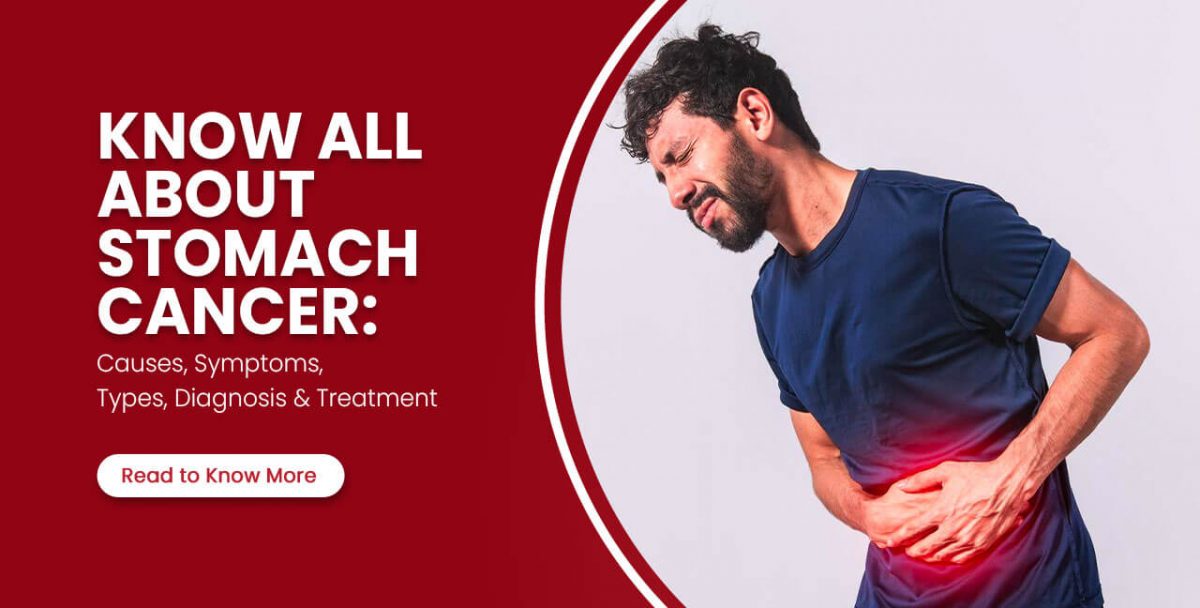
Our stomach is a part of the digestive system, which consists of several muscular, hollow organs connected by a long, winding tube that runs from the mouth to the anus. The digestive system aids in breaking down nutrients in food along with the removal of waste products from the body. Our stomach plays a key role in the functioning of the digestive system. It is located on the left side of our upper abdomen. Stomach (gastric) Cancer is a condition that originates in the stomach’s lining cells and can have a severe impact on our body’s functioning. If left untreated, it may develop into a tumour that grows further into the walls of your stomach. This tumor can further spread to other organs such as the pancreas and liver.
Symptoms of Stomach Cancer
Early-stage stomach cancer usually exhibits no symptoms. Even the most prevalent early indicators of stomach cancer, which are frequently inexplicable weight loss and stomach pain, typically don’t show up until the disease is more advanced.
Stomach cancer symptoms include:
- diminished appetite.
- difficulty in swallowing.
- weakness or exhaustion.
- vomiting and queasiness.
- sudden weight loss.
- indigestion and heartburn.
- vomiting blood or having black stool
- experiencing gas or bloating after eating.
Numerous illnesses also have many of these characteristics. So, consult a doctor to see whether your symptoms indicate stomach cancer or another illness.
What are the Causes of Stomach Cancer?
When there is a genetic mutation (change) in the DNA of your stomach cells, it leads to stomach cancer. Cells are programmed by their DNA to know when to divide and when to grow. The mutation causes the cells to increase quickly, eventually becoming a tumour rather than dying. When cancer cells overpower healthy cells, they have the potential to metastasize, or spread to other areas of your body.
It is unknown to researchers what causes the mutation. However, some factors seem to make stomach cancer more likely. They consist of:
- history of stomach cancer in the family
- infection with Helicobacter pylori (H. pylori)
gastroesophageal reflux disease - stomach ache
- infection with Epstein-Barr virus
- history of stomach polyps or ulcers
- a diet heavy in pickled, smoked, and fatty foods
- an inadequate fruit and vegetable-based diet
- regular contact with materials such as rubber, metal, and coal
- either chewing, vaping, or smoking tobacco
- Excessive alcohol consumption
- Obesity
- Autoimmune atrophic gastritis
Stomach Cancer Diagnosis
Your doctor will review your medical history, inquire about your symptoms, and do a physical examination, which can include physically inspection around the region for a stomach tumour. To identify and classify stomach cancer, they could prescribe some tests.
The doctors can determine the extent of the cancer’s spread thanks to staging. The staging system for stomach cancer goes from 0 (zero) to IV (four). If the cancer is in stage 0, it hasn’t progressed past the lining of your stomach. Stage IV indicates the cancer has spread to other body organs.
Upper Endoscopy – It is frequently employed to identify stomach cancer. During the process, your doctor will put an endoscope—a tiny tube with a camera at the tip—into your mouth and push it to your stomach.
Endoscopic ultrasound- This test helps in determining the stage of cancer. The imagery of your stomach is analysed to understand if the cancer has moved from the lining to the wall of your stomach.
Blood Tests- Blood tests can provide details about the health of your organs. Ineffective organ function could be a sign that cancer has progressed to that organ.
Laparoscopy – When less intrusive techniques, like imaging, haven’t yielded enough information, your provider can evaluate the spread of cancer by doing a laparoscopy. During a laparoscopy, your doctor makes tiny incisions in your abdomen to introduce a tiny camera so they can observe your organs up close.
Stomach Cancer Treatment
Treatment options for stomach cancer will depend on your existing condition and the extent of cancer spread. A team consisting of your primary doctor, an oncologist, and a gastroenterologist is typically involved in the process. They can provide you with treatment recommendations that include.
Surgery- Your doctor may recommend the following kinds of surgical procedures depending on your specific condition.
Upper endoscopy: An upper endoscopy can be used to remove cancer when it is still in its early stages and only affects the uppermost layers of your stomach. During the surgery, the tumour is sliced from the stomach wall and extracted through the mouth by a gastroenterologist.
Gastrectomy – You may require surgery to remove all or part of your stomach if the tumour spreads beyond the surface layers of your stomach. The portion of your stomach affected by the cancer is removed during a subtotal gastrectomy. After a total gastrectomy, your surgeon will attach your oesophagus to your small intestine so that you can continue to eat.
Chemotherapy- Drugs used in chemotherapy (chemo) shrink cancer cells, making surgical removal of the cells easier. Following surgery, chemotherapy can also eradicate the cancer cells that remain. Usually, radiation is utilised in combination with this process for effective treatment.
Radiation- Radiation employs X-ray-like focused energy beams to kill cancer cells. While radiation is not a cure for stomach cancer on its own, it can be used along with chemotherapy before and following surgery. Radiation can also aid in providing relief from symptoms.

 Call-an-Ambulance
Call-an-Ambulance



